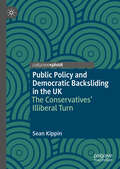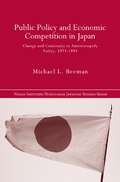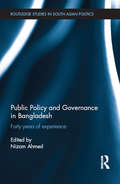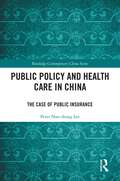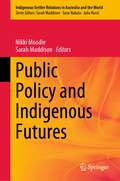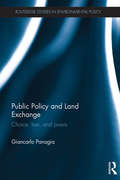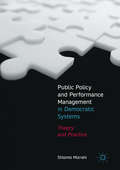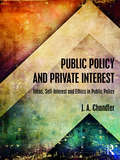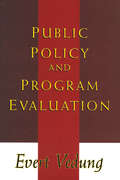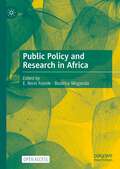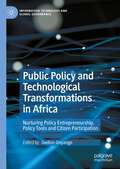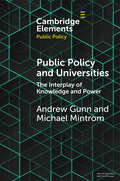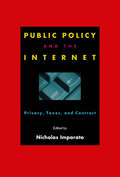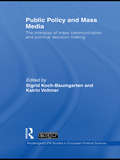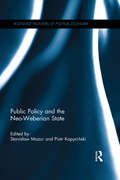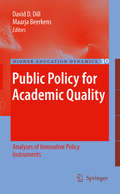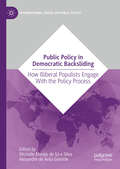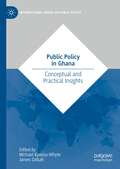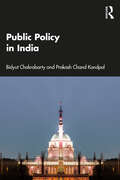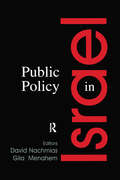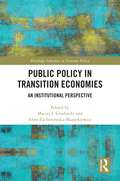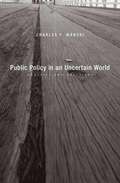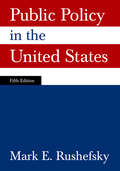- Table View
- List View
Public Policy and Democratic Backsliding in the UK: The Conservatives' Illiberal Turn (Understanding Governance)
by Sean KippinThis book examines the rise of illiberalism within the British Conservative Party during the last few decades. It traces how the party’s political agenda has become increasingly dominated by populist and nativist policy positions since the UK’s withdrawal from the European Union in 2016, and the ways in which this has led to growing concerns over democratic backsliding.Moving beyond debates over the ideology and governing philosophy of the Conservative Party, this book focuses on the specific policy tools it has employed to carry out its political agenda. This includes changes to public spending and taxation, law and regulation, public management, and institutional reform. Bridging the gap between populism studies, UK politics and public policy, the book throws important light on the current state of British democracy, at a time when concerns over the growth of illiberalism and authoritarianism in democratic countries is high.
Public Policy and Economic Competition in Japan: Change and Continuity in Antimonopoly Policy, 1973-1995 (Nissan Institute/Routledge Japanese Studies)
by Michael L. BeemanViewed historically as the lapdog of business, bureaucratic and political interests, Japan's Fair Trade Commission has had mixed success in promoting its agenda for stronger antimonopoly policy since the early 1970s. Dr. Beeman unravels antimonopoly politics in Japan through an analysis of the diverse interests of industry, government, and other parties to reveal how and why antimonopoly policy has made important inroads yet ultimately failed to gain deep acceptance in Japan.Employing extensive use of primary research materials and numerous interviews, Dr. Beeman finds predictable patterns of change as well as themes of continuity in the development of Japan's antimonopoly policy. By addressing a broad array of industry sectors and policy issues, the book provides fresh insight into an agency and a policy that have often been criticized from within Japan as too stringent and from outside Japan as too lax.
Public Policy and Governance in Bangladesh: Forty Years of Experience (Routledge Studies in South Asian Politics)
by Nizam AhmedGood policies are an important prerequisite of good governance, and any effort to change one is likely to affect the other. In emerging democracies, such as Bangladesh, a redefinition of roles and responsibilities of different actors in the policy and governing process can be noticed. This book identifies and analyses issues related to the making and implementation of public policies in Bangladesh over the last four decades (1972-2012). It explores the implications of the change that has taken place in policy and governance environment in Bangladesh. Focusing on several important sectoral and sub-sectoral polices, it examines the impact and limitations of the change. Chapters are structured into four parts: Public Policy, Bureaucracy and Parliament; Cases of Public Policy; Women in Governance and Public Administration; Ethics, Innovations, and Public Service Delivery, and the book is a valuable resource for researchers in the field of development studies, public policy and South Asian politics.
Public Policy and Governance in Bangladesh: Forty Years of Experience (Routledge Studies in South Asian Politics)
by Nizam AhmedGood policies are an important prerequisite of good governance, and any effort to change one is likely to affect the other. In emerging democracies, such as Bangladesh, a redefinition of roles and responsibilities of different actors in the policy and governing process can be noticed. This book identifies and analyses issues related to the making and implementation of public policies in Bangladesh over the last four decades (1972-2012). It explores the implications of the change that has taken place in policy and governance environment in Bangladesh. Focusing on several important sectoral and sub-sectoral polices, it examines the impact and limitations of the change. Chapters are structured into four parts: Public Policy, Bureaucracy and Parliament; Cases of Public Policy; Women in Governance and Public Administration; Ethics, Innovations, and Public Service Delivery, and the book is a valuable resource for researchers in the field of development studies, public policy and South Asian politics.
Public Policy and Health Care in China: The Case of Public Insurance (Routledge Contemporary China Series)
by Peter Nan-shong LeeThis book examines the introduction and ongoing development of public medical care insurance in contemporary China. Based on extensive field investigations, residents’ surveys and analyses by local policy experts and practitioners it provides a comparative analysis of the marketization of public policy in China in contrast to those in other countries, such as the United Kingdom and Germany. The book highlights system-specific issues of the centrally planned economy (CPE) during economic reform, such as alienation of entitlements from funding and historically rooted obligations in the realm of public policy, and as such fills the gap in research on the Chinese government’s public financial management. Public Policy and Health Care in China will appeal to students, academics and researchers interested in public policy and health care in China, as well as Chinese society and economics more broadly.
Public Policy and Indigenous Futures (Indigenous-Settler Relations in Australia and the World #4)
by Sarah Maddison Nikki MoodieThis book focuses on Indigenous self-determined and community-owned responses to complex socioeconomic and political challenges in Australia, and explores Indigenous policy development and policy expertise. It critically considers current practices and issues central to policy change and Indigenous futures. The book foregrounds the resurgence that is taking place in Indigenous governing and policy-making, providing case studies of local and community-based policy development and implementation. The chapters highlight new Australian work on what is an international phenomenon.This book brings together senior and early career political scientists and policy scholars, and Indigenous and non-Indigenous scholars working on problems of Indigenous policy and governance.
Public Policy and Land Exchange: Choice, law, and praxis (Routledge Studies in Environmental Policy)
by Giancarlo PanagiaThis original contribution to the field is the first to bring economic sociology theory to the study of federal land exchanges. By blending public choice theory with engaging case studies that contextualize the tactics used by land developers, this book uses economic sociology to help challenge the under-valuation of federal lands in political decisions. The empirically-based, scholarly analysis of federal-private land swaps exposes serious institutional dysfunctions, which sometimes amount to outright corruption. By evaluating investigative reports of each federal agency case study, the book illustrates the institutional nature of the actors in land swaps and, in particular, the history of U.S. agencies’ promotion of private interests in land exchanges. Using public choice theory to make sense of the privatization of public lands, the book looks in close detail at the federal policies of the Bureau of Land Management and the U.S. Forest Service land swaps in America. These pertinent case studies illustrate the trends to transfer federal lands notwithstanding their flawed value appraisals or interpretation of public interest; thus, violating both the principles of equality in value and observance of specific public policy. The book should be of interest to students and scholars of public land and natural resource management, as well as political science, public policy and land law.
Public Policy and Performance Management in Democratic Systems
by Shlomo MizrahiThis book applies various theoretical tools to explore the advantages and disadvantages of performance management systems, the ways in which they can be improved, and the strategies through which they can be designed and integrated into the policy making process. By providing both theoretical insights and practical applications, it offers a unique perspective. Using four methods of research that have been rarely applied in the performance management literature: formal (game-theoretical) modelling, operational management, new institutionalism, and cross country statistical comparisons based on international data sets, the book illuminates different aspects of performance management systems in the public sector. It offers an integrative theoretical framework for explaining and designing such systems and their integration into the policy making process, and will open up new avenues of research, expose scholars and students to new methodological tools and equip public officials, politicians and citizens with practical methods for improving the performance of the public sector.
Public Policy and Private Interest: Ideas, Self-Interest and Ethics in Public Policy
by J. A. ChandlerPublic Policy and Private Interest explains the complexities of the policy making process in a refreshingly clear way for students who are new to this subject. The key topics it explains are: How policy originates, is refined, legitimised, implemented, evaluated and terminated in the forms of theoretical models of the policy process; Which actors and institutions are most influential in determining the nature of policy; The values that shape the policy agenda such as ideology, institutional self-interest and resource capabilities; The outcome of policies, and why they succeed or fail; The main policy theories including the very latest insights from network theory and post-modernism; How national policy is influenced by globalization. The text is fully illustrated throughout with a broad range of national and international case studies on subjects such as the banking crisis, the creation of unitary authorities and global environmental policy and regulation. Combining both a clear summary of debates and theories in public policy and a new and original approach to the subject, this book is essential reading for students of public policy and policy analysis.
Public Policy and Program Evaluation (Public Policy And Program Evaluation Ser.)
by Evert VedungEvaluation is a controversial and little-understood strategy of public governance, control, and decision making. As early as classical antiquity, scholars were summoned to court to counsel kings. Public policy and program evaluation is a recent addition to the great chain of attempts to use the brainpower of scholars and scientists to further the interests of the state. Evaluation scholars are asked to provide retrospective assessments of the implementation, output, and outcome of government measures in order to effect deeper understanding and well-grounded decisions on the part of those in charge of government operations. Evaluation is the process of distinguishing the worthwhile from the worthless, the precious from the useless; evaluation implies looking backward in order to be able to steer forward better.Written from a political science perspective, Public Policy and Program Evaluation provides an overview of the possibilities and limits of public sector evaluation. Evert Vedung examines evaluation as a mechanism for monitoring, systematizing, and grading government activities and their results so that public officials, in their future-oriented work, will be able to act as responsibly, creatively, and efficiently as possible. Topics discussed include: "Evaluation, Rationality, and Theories of Public Management"; "Models of Evaluation"; "Internal or External Evaluation"; "Impact Assessment as Tryout and Social Experimentation"; "Process Evaluation and Implementation Theory"; "The Eight-Problems Approach to Evaluation"; and "Uses and Users of Evaluation."All evaluation rests upon the idea that perceptions, opinions, intentions, judgments—in short, everything concerned with the world of human consciousness—play such interesting roles in political and administrative action that their functions are worth investigating. Through experience, humans may learn from past actions. The interventions of the modern state are so extensive, their execu
Public Policy and Research in Africa
by E. Remi Aiyede Beatrice MugandaThis open access book responds to the need for a specifically African focus on public policy. It outlines the fundamental principles of public policy research, and engages with major issues in the study of public policy from an African perspective, covering essential topics such as the location and centrality of social sciences in relation to public policy, leadership, methodology, institutions, governance, and gender. This book is essential for understanding the various aspects and dimensions of policy making in Africa that underscore quality research and are at the core of excellence in teaching and learning.
Public Policy and Technological Transformations in Africa: Nurturing Policy Entrepreneurship, Policy Tools and Citizen Participation (Information Technology and Global Governance)
by Gedion OnyangoThis book examines the links between public policy and Fourth Industrial Revolution (4IR) technological developments in Africa. It broadly assesses three key areas – policy entrepreneurship, policy tools and citizen participation – in order to better understand the interfaces between public policy and technological transformations in African countries. The book presents incisive case studies on topics including AI policies, mobile money, e-budgeting, digital economy, digital agriculture and digital ethical dilemmas in order to illuminate technological proliferation in African policy systems. Its analysis considers the broader contexts of African state politics and governance. It will appeal to students, instructors, researchers and practitioners interested in governance and digital transformations in developing countries.
Public Policy and Universities: The Interplay of Knowledge and Power (Elements in Public Policy)
by Michael Mintrom Andrew GunnHigher education is undergoing unprecedented transformation. In the global knowledge economy universities are of paramount importance to governments worldwide. This creates a strong rationale for an element exploring how the interactions between universities and the state are being reconfigured, while highlighting the role policy analysis can play in explaining these dynamics. Specifically, this element draws on four theoretical approaches – New-Institutionalism, the Advocacy Coalition Framework, the Narrative Policy Framework, and Policy Diffusion and Transfer – to inform the analysis. Examples are drawn from a range of countries and areas of potential research informed by policy theory are identified. This element features a section dedicated to each of the three main missions of the university followed by an analysis of the institution as a whole. This reveals how universities, while typically seeking greater autonomy, remain subject to a multifaceted form of nation state oversight as they continue to globalise in an uncertain world.
Public Policy and the Internet: Privacy, Taxes, and Contract
by Nicholas ImparatoThis book presents the initial findings that framed early discussions on Internet public policy and outlines proposals that should guide policymaking in the future. In addition, Cronin, McLure, and Radin's viewpoints show that the future of e-commerce has as much to do with how policy issues are resolved as with how technological challenges are overcome.
Public Policy and the Mass Media: The Interplay of Mass Communication and Political Decision Making (Routledge/ECPR Studies in European Political Science)
by Sigrid Koch-BaumgartenThe mass media are playing an increasingly central role in modern political life that expands beyond their traditional function as mediators between the world of politics and the citizens. This volume explores the extent and circumstances under which the media affects public policy; whether the political impact of the media is confined to the public representation of politics or whether their influence goes further to also affect the substance of political decisions. It provides an in-depth understanding of the conditions under which the media might, or might not, play a role in the policy process and what the nature of their influence is. Bringing together conceptual and methodological approaches from both political science and communications studies, this book presents an interdisciplinary perspective. It presents empirical evidence of the processes involved in the interaction between mass communication and policy and features case studies from Western Europe and the US and across different policy fields. The book will be of interest to students of public policy, political communication and comparative politics.
Public Policy and the Neo-Weberian State (Routledge Frontiers of Political Economy)
by Stanisław Mazur Piotr KopycinskiThe neo-Weberian state constitutes an attempt to combine the Weberian model of administration with the principles laid down during the retreat from the bureaucratic management paradigm (new public management and public governance). The concept of neo-Weberian state involves changing the model of operation of administrative structures from an inward-oriented one, focused on compliance with internal rules, into a model focused on meeting citizens’ needs (not by resorting to commercialisation, as is the case with new public management, but by building appropriate quality of administration). This book discusses the context of the neo-Weberian approach and its impact on the processes of societal transformation. Further, it identifies and systematises the theoretical and functional elements of the approach under consideration. This volume includes comparative analyses of the neo-Weberian state and public management paradigms. In the empirical part of the work, its authors review selected policies (economic, innovation, industrial, labour, territorial, urban management, and health) from the perspective of tools typical of the neo-Weberian approach. This part also includes a critical scrutiny of changes which have taken place in the framework of selected policies in recent decades. The study assesses the appropriateness of the neo-Weberian approach to the management of public affairs regarding countries which have modernised their public administrations in its spirit. One of the aims of this analysis is to answer the question whether the application of neo-Weberian ideas may result in qualitative changes in the context of public policies. The final part of the book covers implications for public management resulting from the concept of neo-Weberian state. Public Policy and the Neo-Weberian State is suitable for researchers and students who study political economy, public policy and modern political theory.
Public Policy for Academic Quality
by Maarja Beerkens David D. DillOver the last decade the structure of higher education in most countries has undergone significant change brought about by social demands for expanded access, technological developments, and market forces. In this period of change the traditional concerns with access and cost have been supplemented by a new concern with academic quality. As a consequence, new public policies on academic quality and new forms of academic quality assurance have rapidly emerged and swiftly migrated across continents and around the globe. The growing public debate about academic quality assurance within and across countries however has not always been well informed by analyses of the strengths and weaknesses of these new policy instruments. The Public Policy for Academic Quality Research Program (PPAQ) was designed to provide systematic analyses of innovative external quality assurance policies around the world. This volume presents the fourteen analyses of national policies on academic quality assurance conducted as part of the PPAQ Research Program utilizing the knowledge of informed international scholars. Each policy analysis examines the policy goals, implementation problems, and impacts of these newly developed national quality assurance instruments. The book concludes with an assessment of the lessons learned from these collected policy analyses and outlines the framework conditions that appear essential for assuring academic standards in the university sector.
Public Policy in ALS/MND Care: An International Perspective
by David Oliver Robert H. Blank Jerome E. KurentThis book focuses on the public policy and political/ethical dimensions of ALS/MND across a wide selection of countries and argues for the need of a multidisciplinary and international approach. Policy issues addressed include adequacy of funding for research and care, payment policy and regulatory functions of public and private insurers, long-term services and caregiver support, public health and prevention efforts, access to genetic testing and assisted technologies, ensuring a competent and adequate workforce especially for hands-on caregivers, and the challenging issues of providing palliative and hospice care for ALS/MND patients, advance directives and assisted suicide that face policy makers in all political jurisdictions.
Public Policy in Democratic Backsliding: How Illiberal Populists Engage with the Policy Process (International Series on Public Policy)
by Michelle Morais de Sá e Silva Alexandre de Ávila GomideThis book examines the impact of democratic backsliding and populist governments on the public policy process. Drawing on case studies from the USA, Brazil, Hungary, Mexico, Poland, Turkey, and the Philippines, it assesses how elected populist governments have eroded policy capabilities and dismantled state apparatuses responsible for making and implementing policy. The book offers a unique perspective into democratic backsliding through a public policy lens, and considers why, when and how policy processes change as a result of populist governments. Numerous policy issues are analysed throughout the volume, including environmental, health and economic policies. It will appeal to all those interested in public policy, democracy studies, and public administration.
Public Policy in Ghana: Conceptual and Practical Insights (International Series on Public Policy)
by Michael Kpessa-Whyte James DzisahThis book provides analytical, conceptual, and practical insights into how public policy processes and outcomes are conceptualized and framed. Drawing on Ghanaian experiences, but with extensive illustrations from other African countries, it showcases issues of commonality and diversity in public policy with analytical insights and real-life policy concerns that specifically address how citizens engage with the state, and how they think and function as social actors within the socio-cultural settings of Africa. The book brings public policy to life as a practical and problem-solving discipline, with examples of how policy actors such as the legislature, governance architects, the media, and the judiciary become arenas for contest. Linking public policy to development paradigms, governance, and responsible citizenship, it is important reading for students and scholars of public policy, governance, and politics in Africa, as well as practitioners.
Public Policy in India
by Bidyut Chakrabarty Prakash Chand KandpalThis textbook is a comprehensive, student-friendly guide to public policy in India. It highlights the critical aspects of public policy-making and its implementation by contextualizing it in the Indian historical and modern-day perspective. Public Policy in India: • Provides lucid explanations of theoretical aspects of public policy and its practice in the Indian context; • Captures the complexities in making, implementing and evaluating public policy; • Studies the dialectical interconnection that public policy has with the socio-economic and political environment; • Highlights the influence of culture on public policy; and • Analyses public policy as an outcome of a very complex contextual dialogue involving various kinds of actors. Accessibly written, this book covers a range of university syllabi and will be essential reading for students and researchers of political science and public administration. It will also be indispensable for civil service examinations, including the UPSC.
Public Policy in Israel (Israeli History, Politics and Society #Vol. 17)
by David Nachmias Gila MenahemAn examination of the current Israeli government, covering public policies such as health, housing and transport. The volume covers the institutional as well as the political and the bureaucratic framework within which public policies have been made and implemented.
Public Policy in Transition Economies: An Institutional Perspective (Routledge Advances in Economic Policy)
by Maciej J. Grodzicki Anna Zachorowska-MazurkiewiczPublic policies are usually carefully designed to address a particular problem, but they are also shaped and influenced by the sociocultural heritage of a particular country. This volume explores the origins of economic and other public policies in Central and Eastern Europe.This region makes for a particularly interesting case because after going through a major system change – transitioning from a command economy into a market economy – many of the key policies were written anew. The contributors to this book look at key policy areas at the intersection of state and private sectors, including industrial, pension, energy, and competition policies. The chapters examine key questions such as: how did these policies evolve from the time of transition to their final form? What were the main drivers of policy conduct and factors influencing major policy choices? How does the historical context impact contemporary policy space? Throughout the volume, an institutional approach is adopted, according to which policies are perceived as the outcome of top‑down design, filtered through social institutions inherited from the past. With this approach, this book presents a long‑running assessment, over 30 years, of policymaking in transition economies, which were subject to profound changes throughout the period.This book will be of interest to readers in institutional economics, policy studies, transition economies, and the recent history of Eastern Europe.
Public Policy in an Uncertain World
by Charles F. ManskiPublic policy advocates routinely assert that research has shown a particular policy to be desirable. But how reliable is the analysis in the research they invoke? And how does that analysis affect the way policy is made, on issues ranging from vaccination to minimum wage to FDA drug approval? Charles Manski argues here that current policy is based on untrustworthy analysis. By failing to account for uncertainty in an unpredictable world, policy analysis misleads policy makers with expressions of certitude. Public Policy in an Uncertain World critiques the status quo and offers an innovation to improve how policy research is conducted and how policy makers use research. Consumers of policy analysis, whether civil servants, journalists, or concerned citizens, need to understand research methodology well enough to properly assess reported findings. In the current model, policy researchers base their predictions on strong assumptions. But as Manski demonstrates, strong assumptions lead to less credible predictions than weaker ones. His alternative approach takes account of uncertainty and thereby moves policy analysis away from incredible certitude and toward honest portrayal of partial knowledge. Manski describes analysis of research on such topics as the effect of the death penalty on homicide, of unemployment insurance on job-seeking, and of preschooling on high school graduation. And he uses other real-world scenarios to illustrate the course he recommends, in which policy makers form reasonable decisions based on partial knowledge of outcomes, and journalists evaluate research claims more closely, with a skeptical eye toward expressions of certitude.
Public Policy in the United States
by Mark E RushefskyThe fifth edition of this well-regarded text covers the period up through the 2012 elections. It has been revised to make it sleeker, more concise, and up-to-date with a clear organisational structure.This edition accomplishes these three important goals:First, it introduces readers to the American approach to public policy making as it has been shaped by our political institutions, changing circumstances, and ideology.Second, it surveys American public policy and policymaking in all the major policy areas from economic policy to health care policy to environmental policy, and does so clearly and even-handedly, with well-selected illustrations, case studies, terms, and study questions.Finally, in addition to providing analytical tools and empirical information, the book challenges readers to come to terms with the widely shared but often competing values that must be balanced and rebalanced in the ongoing policy making process, affecting issues of the highest concern to the American public.
